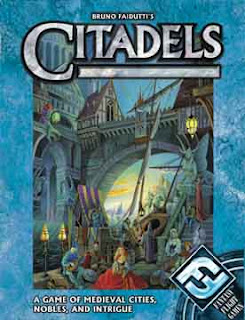Citadels


One of the more entertaining aspects of geek life is the joy in gathering friends, popping open bottles of alcohol and starting a game of some sort. And not a drinking game - I'm talking about a board game of some sort, although many of the geekier games tend to not involve a board at all! But the basic principle remains the same and there's a lot of fun to be had.
Now it amuses me how well some of my gay geek friends have taken to playing Citadels so much. I guess it's because the game naturally pits a large group of players in competition with one another, thus naturally leading to a lot of witty banter, name-calling and friendly insults. The modest psychological warfare is part and parcel of the whole gaming experience and pretty much queer socializing when you think about it.
We're just sassy that way.
But no, you don't need to be queer to enjoy this game. It's the kind of game that naturally brings out your sense of competition given the sheer number of players that the game can support. Plus it's a heck of a lot of fun, too.
Citadels is essentially a card game type of "board" game created by Bruno Faiduti. It was originally released in French before it made the rounds in German and other languages. The game thus far has an expansion with gives alternate character types and another expansion that provides additional citadel types.
But I'm a getting ahead of myself. Let's run through the rules pretty quickly.
The game has two main phases - one where each player selects a character and the other where each player gets to act. Character selection consists of secret draft process where each player secretly selects a character card. Each character has unique powers in the game but can also be at risk since players can target other characters that they can name. One character card is left out of the draft each round in order to add that element of surprise in the game.
Once each player has a character, then the real fun begins. The person who is currently the King starts calling out the various roles starting with the Assassin and the proceeds from there. As each player is called, they first decide if they will use their special action (e.g. the Assassin names another character who will "die", thus losing his turn) and then playing out his turn by either drawing a card or getting gold and then building a district is they have enough resources. The first person who reaches 8 districts will end the game that turn and from there you get to determine the final scores by totaling the value of all district cards in play for each of the players.
The basic rules of the game seem simple enough but things really get interesting once the players start to get a better feel for how each of the character roles work from a strategic perspective. For example, seeing a player build-up an increasing amount of gold may potentially be aiming to build more districts with the aid of the abilities of the Architect or destroy rival districts with the power of the Warlord. Thus you might want to take the role of the Assassin to kill either character role or use the Thief to steal the gold - provided you guess what the role of that player is going to be.
Thus it becomes a game with a need to read your rival players well as you hope to determine what their chosen character roles are in order to gain some sort of a competitive advantage. Thus often times people will opt to switch over to being the King in order to choose his character first the next time around, however the King is a pretty high profile character that is often targeted for assassinations as well. And quirks of the possible strategies goes on and on.
With the full expansions, you can play with about 2-7 players, but the game really starts to shine once you have at least 5 at the table. And the expansions let you have alternate character swap in to replace the original 8. Or you can add in special district cards that do anything from requiring players to say "Thank you your Majesty" every time the King calls on your role or even change the end game condition to just 7 districts instead of 8.
Citadels isn't your run-of-the-mill card game and it can quickly become a rather high-stakes game of strategy, especially among good friends. As always, the better you know other players, the more interesting the game as you may stand a better chance of reading them - but they can also better read you. Thus the game rates a crazy 5 strategic reversals in-game out of a possible 5.